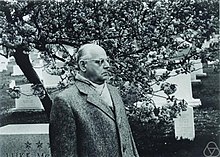Alexander Ostrowski | |
|---|---|
 | |
| Born | 25 September 1893 |
| Died | 20 November 1986 (aged 93) |
| Scientific career | |
| Thesis | Ueber Dirichletsche Reihen und algebraische Differentialgleichungen (1920) |
| Doctoral advisor | Edmund Landau Felix Klein |
| Other academic advisors | Dmitry Grave Kurt Hensel |
| Doctoral students | Theodore Motzkin Walter Gautschi Stefan E. Warschawski |
Alexander Markowich Ostrowski (Ukrainian: Олександр Маркович Островський; Russian: Алекса́ндр Ма́ркович Остро́вский; 25 September 1893 – 20 November 1986) was a mathematician.
His father Mark having been a merchant, Alexander Ostrowski attended the Kiev College of Commerce, not a high school, and thus had an insufficient qualification to be admitted to university. However, his talent did not remain undetected: Ostrowski's mentor, Dmitry Grave, wrote to Landau and Hensel for help.
Subsequently, Ostrowski began to study mathematics at Marburg University under Hensel's supervision in 1912. During World War I he was interned, but thanks to the intervention of Hensel, the restrictions on his movements were eased somewhat, and he was allowed to use the university library.
After the war ended, Ostrowski moved to Göttingen where he wrote his doctoral dissertation and was influenced by Hilbert, Klein and Landau. In 1920, after having obtained his doctorate from the University of Göttingen,[1] Ostrowski moved to Hamburg where he worked as Hecke's assistant and finished his habilitation in 1922. In 1923, he returned to Göttingen and, in 1928, became Professor of Mathematics at Basel, until retirement in 1958. In 1950, Ostrowski obtained Swiss citizenship. After retirement, he still published scientific papers until his late eighties.
His work was mainly, but not exclusively in algebra and number theory, and he had a great interest in numerical methods as well as abstract mathematics.[2]
- ^ "Alexander Ostrowski - The Mathematics Genealogy Project". www.mathgenealogy.org. Retrieved 2024-01-20.
- ^ "Who's That Mathematician? Paul R. Halmos Collection - Page 38". Mathematical Association of America.